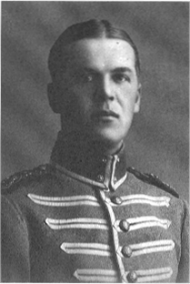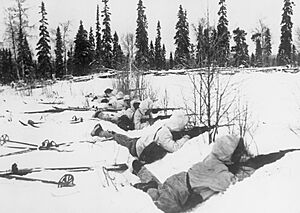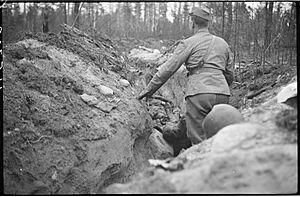Arnold Majewski facts for kids
Quick facts for kids
Arnold Majewski
|
|
|---|---|

Majewski in uniform in the early 1920s
|
|
| Birth name | Karl Arnold Woldemar Majewski |
| Other name(s) | Arnold Majewski |
| Nickname(s) | Mäski |
| Born | 11 December [O.S. 29 November] 1892, Tallinn, Russian Empire (present-day Estonia) |
| Died | 10 October 1942 (aged 49) Rukajärvi, Soviet Union (present-day Russia) |
| Buried |
Turku Cemetery
|
| Allegiance | |
| Service/ |
|
| Rank | Lieutenant Colonel |
| Unit | I/JR 10 |
| Battles/wars |
|
Karl Arnold Woldemar Majewski (11 December 1892 – 10 October 1942) was a brave and well-known Finnish cavalry officer. He was of Polish background. Many stories were told about him because of his unique personality.
Contents
Early Life and Adventures
Arnold Majewski was born in Tallinn, which is now in Estonia. His family had a long history of soldiers. His grandfather, Wladislaus Majewski, came from Poland and served in the Russian army. Arnold's father, Alexander Majewski, also served in the army and later settled in Helsinki, Finland. Arnold's mother was Finnish.
After finishing school in 1912, Majewski decided to go on an adventure. He traveled far and wide, searching for gold in Siberia. He also explored the Far East and North America before finally settling in St. Petersburg, Russia.
Joining the Army in Finland
When the Finnish Civil War began, Majewski returned to Finland. He joined the White Army as a volunteer cavalry soldier. He fought in important battles in places like Vyborg and Terijoki.
After the war, he decided to continue his military career. He trained to become an officer and quickly became a cavalry captain. In the 1920s and 1930s, Majewski served in the Häme Regiment. He became a squadron leader in 1926. His friends called him "Mäski," and he was known for his lively personality and enjoying his free time.
Marriage
In 1941, Majewski married Helga Sonck-Majewski. She was a pharmacist. They did not have any children.
Serving in World War II
During the Winter War, Majewski fought bravely in Ladoga Karelia, including the tough Battle of Kollaa. He was one of the youngest battalion commanders. He quickly became known as a very daring officer who was never afraid to face danger.
After the Winter War, Majewski was promoted to Major. There was even talk of giving him a very special award called the Mannerheim Cross First Class, which is rarely given out.
In the Continuation War, Majewski became famous for a daring mission in January 1942. He led a 100-kilometer winter raid deep behind Soviet lines to a place called Mai Guba.
Because he had traveled so much and had a Polish background, Majewski's Finnish language skills were not perfect. This led to some famous and funny stories about him. At the start of the Mai Guba raid, he gave his troops a memorable speech that later became well-known:
Hyvät härrat. Me ole saatu Marsalkkalta yks kunniakas tehtävä. Me hiihtää Muurmannin rata, pane rata poikki ja anta ryssä pistä meidät motti. Sitte me ole kolme päivä motissa ja sitte me hiihtä takasi. Onko selvä, onko mite kysymistä?
Gentlemen. We have received an honourable mission from the Marshal. We have to ski to the Muurmanni railway track, cut the track and let the Russians surround us. Then we have to remain surrounded for three days and then ski back. Am I making this clear, or are there any questions?
Majewski was wounded by shrapnel (small metal pieces from an explosion) near the end of the Winter War. He was promoted again after the war.
In the Continuation War, he fought on the Rukajärvi front. Here, he earned a reputation as one of the bravest commanders. He was promoted to Lieutenant Colonel in April 1942.
On October 10, 1942, Majewski was killed in action at Rukajärvi. He was showing the position of his battalion to some photographers and reporters after a battle. As he was looking over the edge of a trench, a Soviet sniper shot him.
Arnold Majewski was buried in his family's grave at the Turku Cemetery.
Images for kids
 | May Edward Chinn |
 | Rebecca Cole |
 | Alexa Canady |
 | Dorothy Lavinia Brown |





